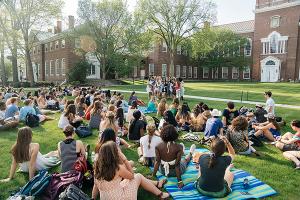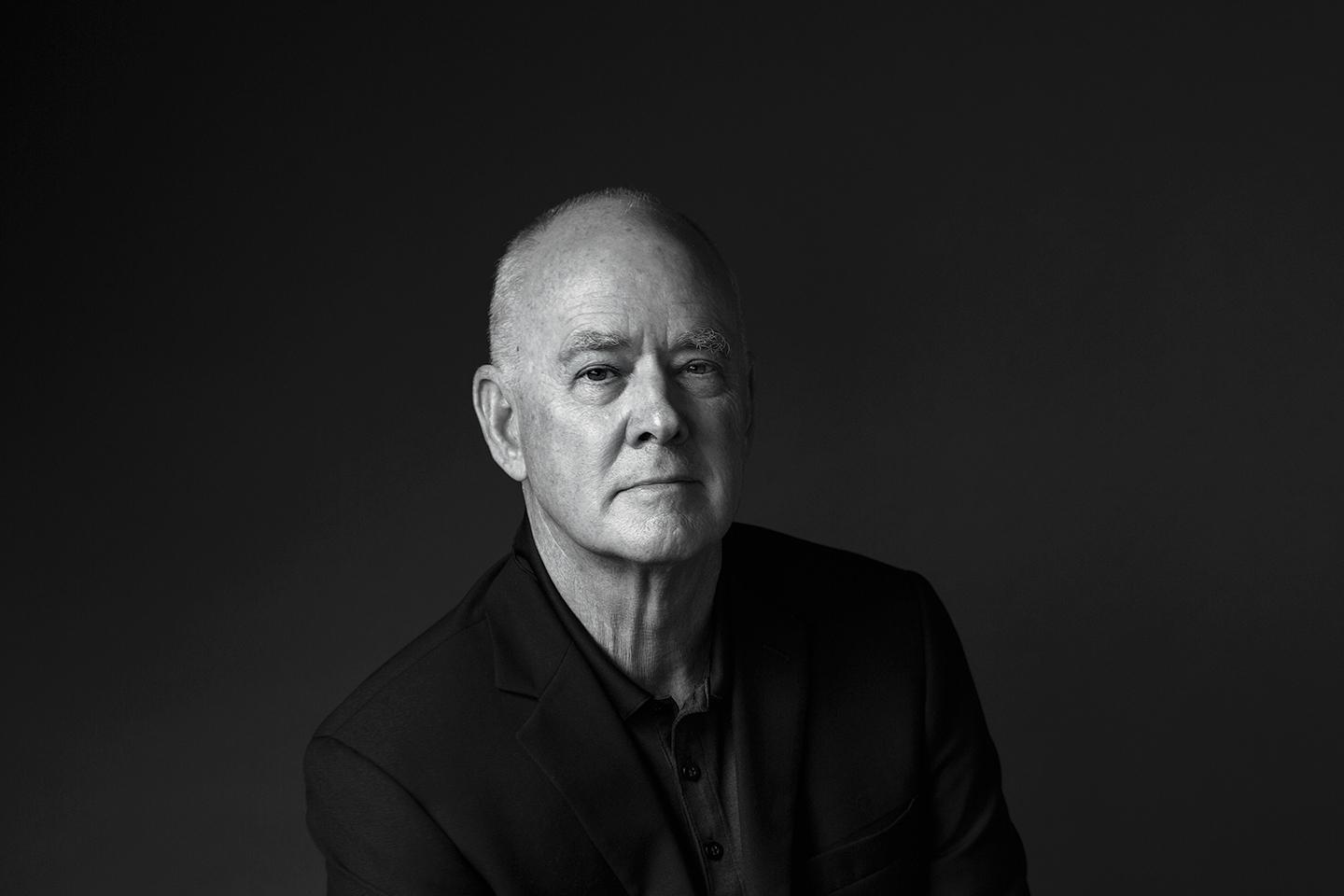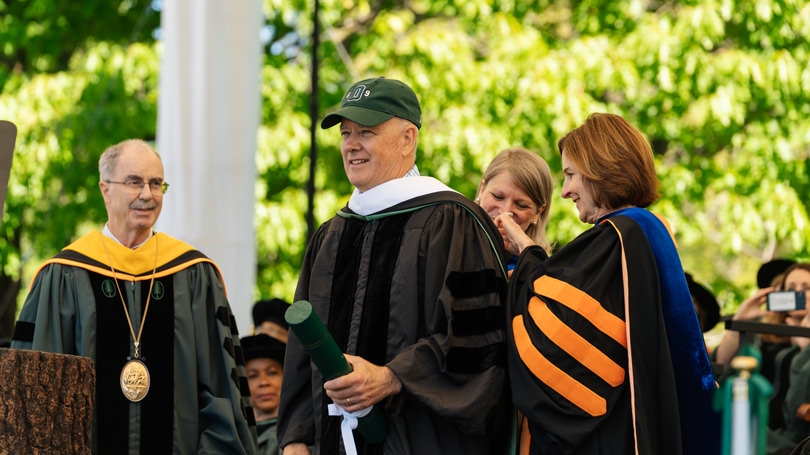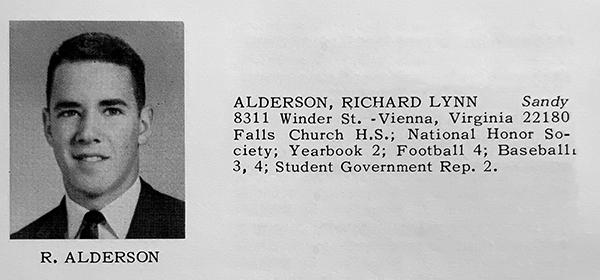
Dartmouth College Fund: Financial Aid
In uncertain times, one thing is certain: Dartmouth stands by our students. Give now to help students in this moment.
Sandy Alderson ’69 H’19 reflects on how a healthy curiosity prepared him for life

Dartmouth gave Sandy Alderson ’69 H’19 an abiding curiosity for learning that has taken him from the fighting fields of Vietnam to the playing fields of MLB baseball. Here, he shares his candid recollections on late-60s Dartmouth, the pursuit of excellence, and the power of a liberal arts education.
As an Air Force family, we moved a lot. I learned about Dartmouth from a high school French teacher in Molesworth, England, who left his Dartmouth alumni magazines in the classroom. Two years later, as a high school senior in Virginia, I applied to three schools and got into one: Dartmouth. Attending was the best decision I never had to make. When I arrived for classes, I had never even been to New England. My first impressions of the Hanover Plain? Remote and daunting.
Had it not been for a Naval ROTC scholarship, I probably would not have been at Dartmouth. Ralph Manual, the Dean of Freshman in 1965 and my freshman advisor, helped me get that scholarship. He was a mentor during my first year or two, but I have to say, the faculty most impactful to me were my ROTC instructors. Don’t get me wrong, I cherish my liberal arts education and soon after graduation understood more fully its value, but there was something practical and hands on about the ROTC program that I enjoyed.
ROTC had a large footprint at Dartmouth in those days; probably close to 200 undergraduates participated. In 1965, Vietnam was not the issue it later became. In the meantime, other events, like the civil rights movement, the assassinations of Martin Luther King and Robert Kennedy, and the presidential election of 1968, also made the late 1960’s the tumultuous period it was.
When Dartmouth eliminated ROTC a few years later, for what I thought were dubious reasons, I was very angry and stopped my support of the College for a time. With the help of Jim Wright, a former Marine, I got over it.

My freshman and sophomore years were rough. My grades were lousy, and while I played baseball on the freshman team and as a sophomore on the varsity, I wasn’t very good. We had a great time with Coach Eddie Jeremiah, the legendary hockey coach, on the frosh team, but I’m sure Tony Lupien was happy when I stopped wasting some of his valuable practice time the next year.
Things turned around my junior year. Probably just part of the maturation process, but I began to really enjoy the academic work. My grades improved dramatically and I began to explore some of the other aspects of Dartmouth life. I’ve found in my career that having a healthy curiosity is a valuable, almost indispensable quality. The key to being a “life-long learner,” I believe, is having a life-long curiosity that drives one’s interest in learning. My curiosity in all things was awakened at Dartmouth and has stayed with me ever since.
I got involved with WDCR that year and did some sports broadcasting. We did play-by-play of all the football games (often with my classmate, Peter Schaefer) and some of the basketball games when Dave Gavitt was the coach. We even broadcast the 1968 NCAA Swimming Championships that were held at Dartmouth. Close your eyes; can you imagine radio play by play of the 1500-meter freestyle? Didn’t think so.

"My curiosity in all things was awakened at Dartmouth and has stayed with me ever since."
Spring term of that year, I was off campus and traveled to South Vietnam as an accredited journalist. That’s a longer story, but in preparation, I took a self-designed course on Vietnamese history. There was only one textbook at the time, written by Joseph Buttinger; most of the contemporary history there had been written by French journalists like Bernard Fall.
I found that Dartmouth was great about supporting student interests and providing innovative opportunities at a difficult time. My senior year, I participated in Dartmouth Outward Bound run by Will Lange, who is now a New England public radio legend. A good friend of mine, Mike Stratton, got me involved. It was a great opportunity to learn and lead in a challenging environment—the Atlantic Ocean off the coast of Maine.
Our graduation on the Green was rained out (how appropriate), but I was commissioned a Marine officer in the BEMA that weekend. The ceremony, involving about one hundred of us from all the services, was protected by a cordon of plain clothes state troopers. Sign of the times.
After basic officer training in Virginia and Vietnamese language training in California, I was assigned to the First Marine Division in Vietnam as an infantry platoon commander. Almost immediately, my liberal arts background differentiated me from others in my situation. I simply made decisions differently, with a very different set of considerations and priorities. Junior officers are always carrying out someone else’s orders, but it’s how those orders are carried out that can make all the difference.
This is why it is so important to have a diverse cadre of officers in the military and why I was so unhappy that Dartmouth had ended ROTC. It was a lost opportunity for the College to influence and shape military decision making at the ground level. This is especially important considering the all-volunteer environment that exists in the military today.
After the Marines, I attended Harvard Law School and then practiced law in San Francisco for five years. In 1980, one of the other lawyers in the firm, Roy Eisenhardt, and his father in law, Walter Haas of the Levi Strauss family, bought the Oakland A’s from Charley Finley. I had been working closely with Roy (Dartmouth Class of 1960) so it was natural that I would help him with the sale. The following year, I joined the A’s as general counsel and, in late 1983, became the general manager of the A’s. Roy made me the GM not because of my baseball expertise, which was minimal at best at that time, but because of his confidence in my judgment. That good judgment, if it did indeed exist, was founded and first nurtured in my years at Dartmouth.
I stayed with the A’s for 17 years, spent another six with Major League Baseball in New York, and then spent four years with the San Diego Padres. More recently, I was the general manager of the New York Mets and served as an advisor with the Oakland A’s. I was recently offered an opportunity to return to the New York Mets as team president, pending MLB owners’ approval of new team ownership.
I’ve been around the block, I guess.
The College has changed in many ways since my graduation, some fundamental (coeducation), and some more subtle. But they are mostly for the better, in my view. The commitment of any institution with a reputation for excellence should be to excellence itself, not to some memory of a supposed “golden age” that never or only briefly existed. The pride I have today in my affiliation with Dartmouth is more about the College as it exists today than it is about my memory of what it was fifty years ago. Our reference point is today, not yesterday. Accordingly, Dartmouth’s mission should be to consider and implement where appropriate the changes that are necessary from time to time to maintain its standard of excellence in a rapidly shifting educational environment. Of course, it must accomplish this while honoring Dartmouth’s emphasis on undergraduate education and the teacher-first model.
It was one of the great honors of my life to be awarded an honorary degree by the College in 2019. I was happy to represent the Class of 1969 in that capacity, knowing there were dozens in the class who could have received it. I accepted the degree on their behalf and with them in mind.
My advice to today’s undergraduates is two-fold. First, exercise your curiosity and let it guide you. Curiosity will enrich your entire life. Second, whatever you are doing today, whether in your personal or professional life, do it as well as you can. Strive for excellence and people will notice. Opportunity will follow. Life is like a hitter at the plate, people are watching and excellence will be noted.